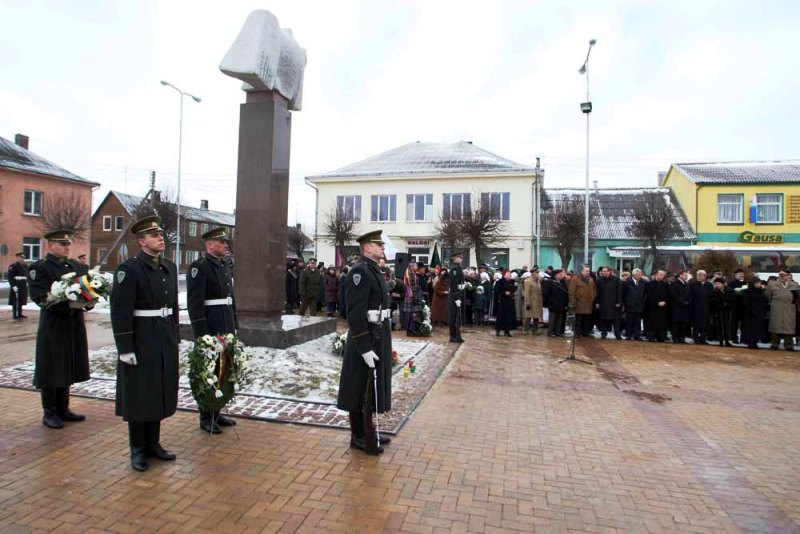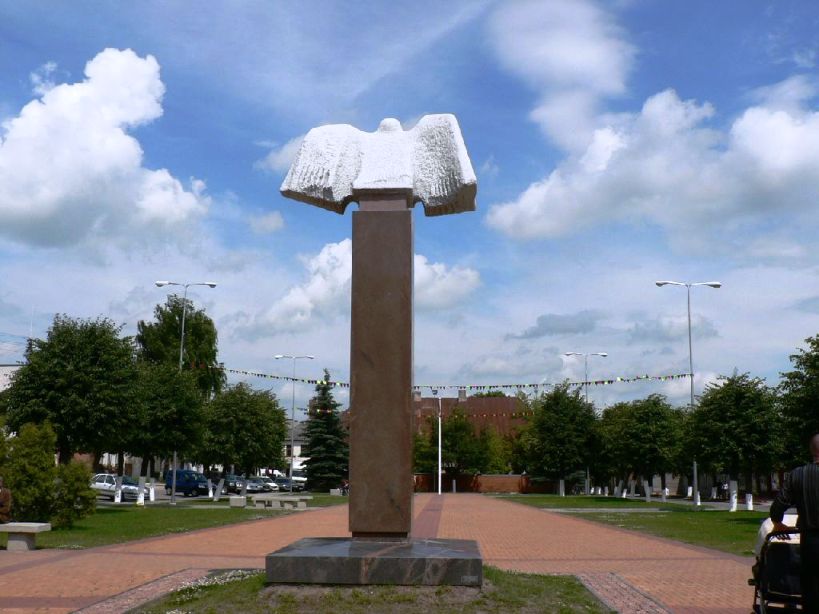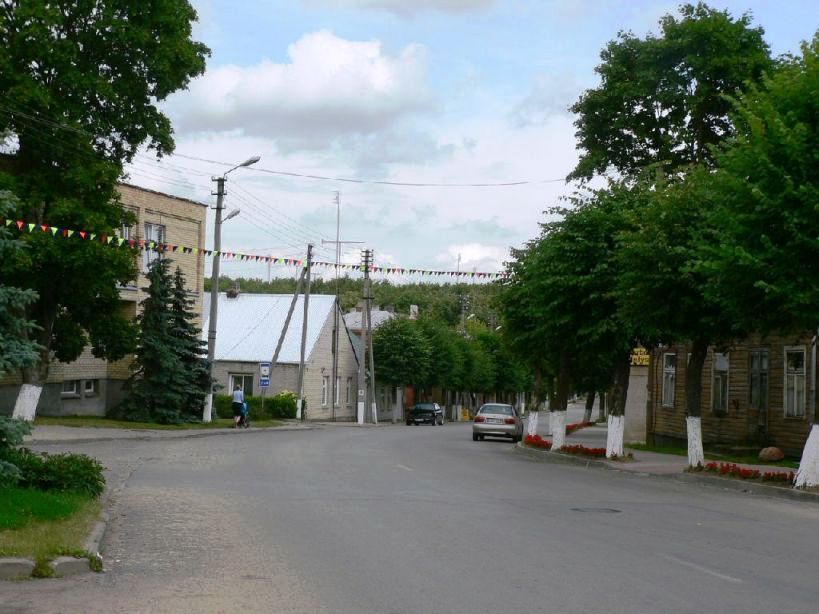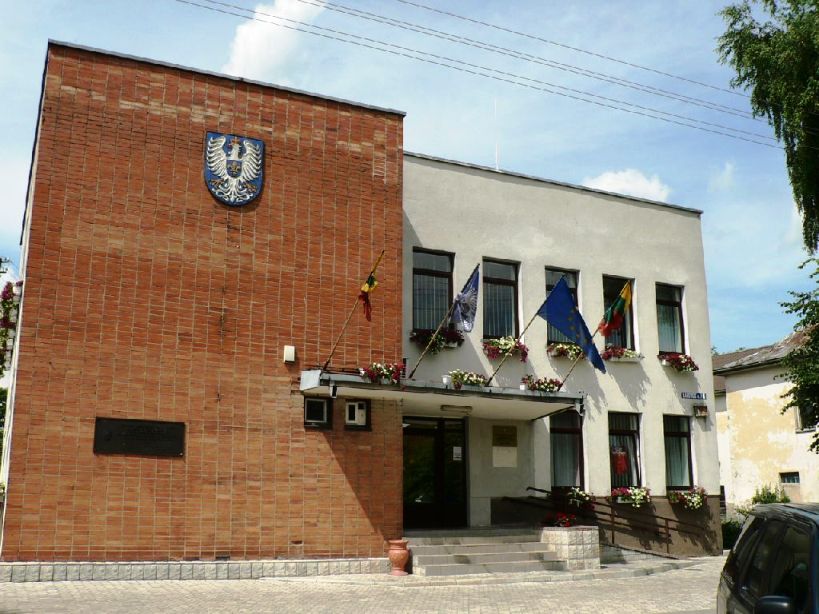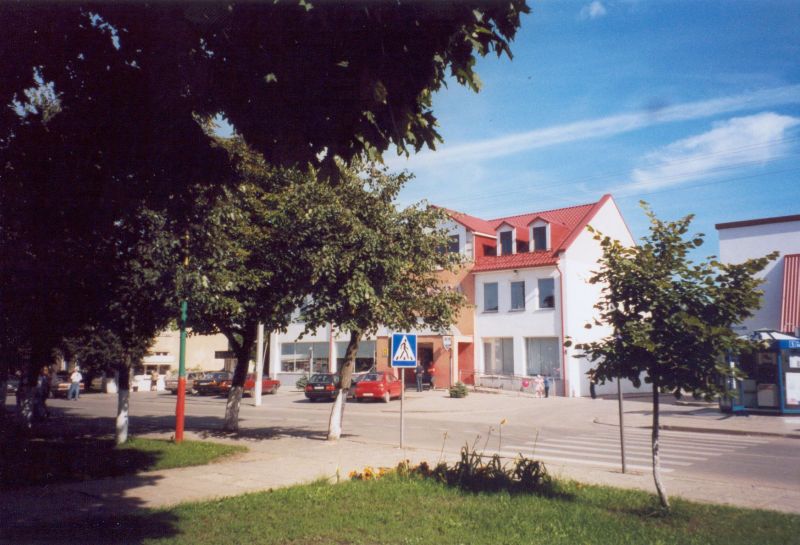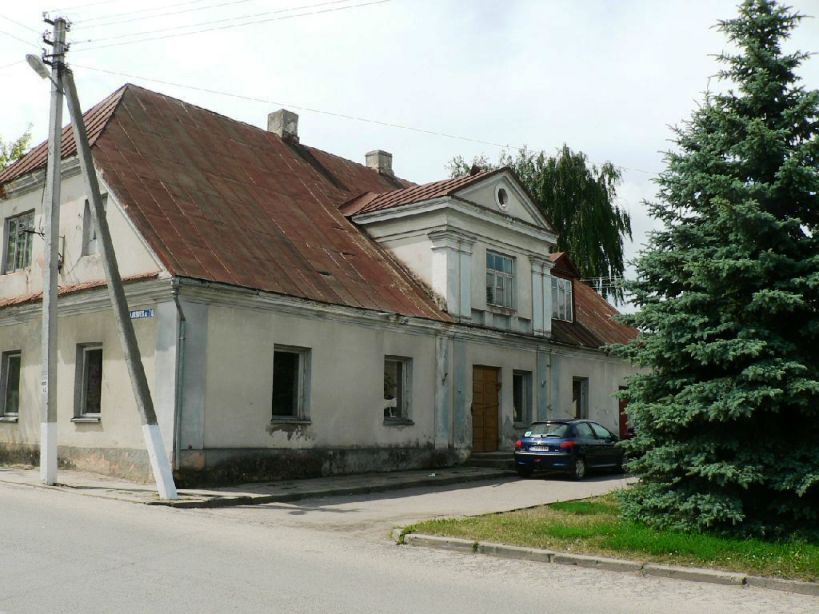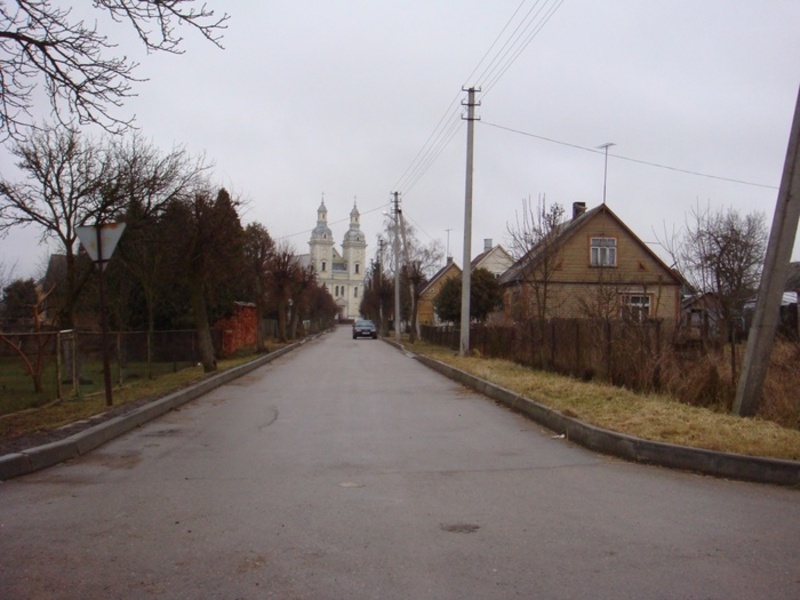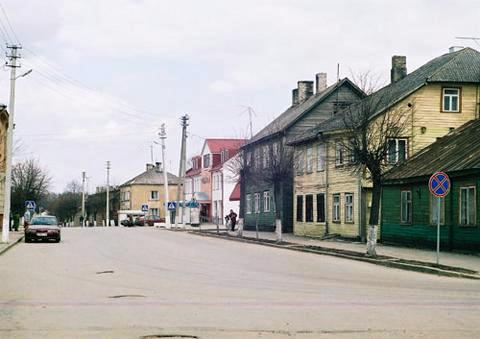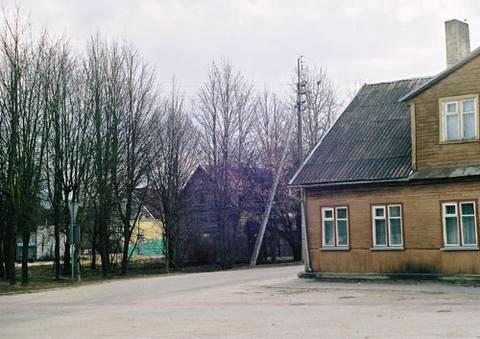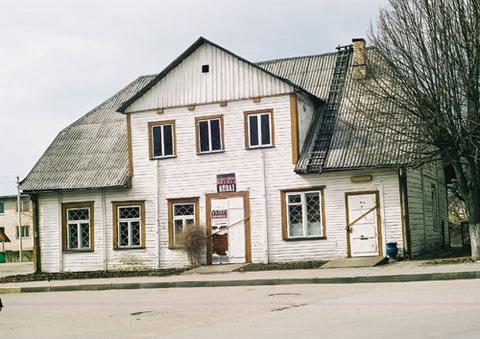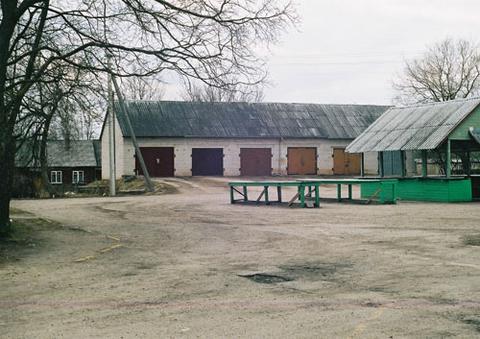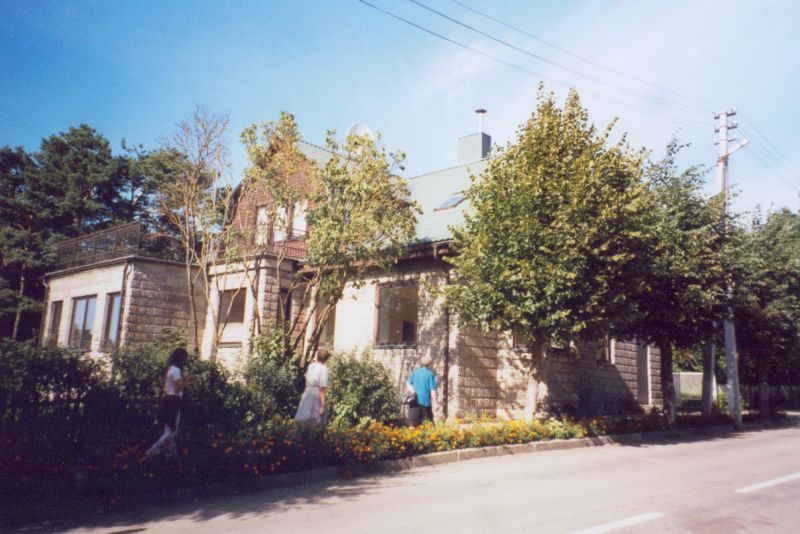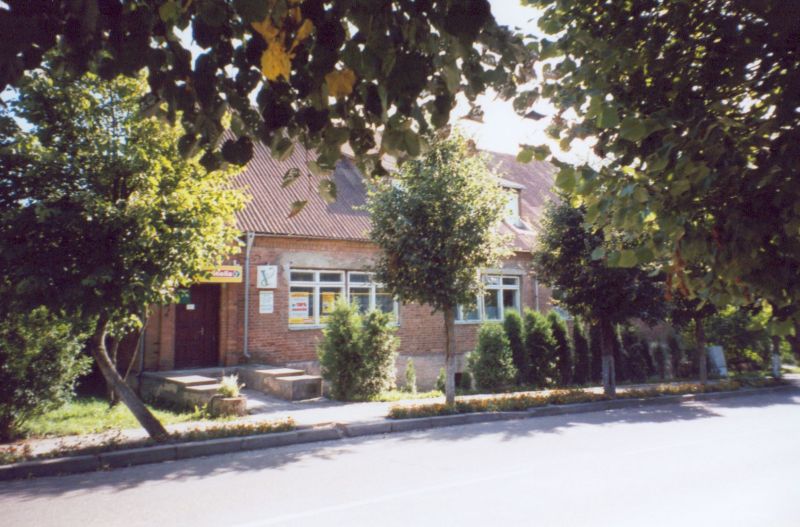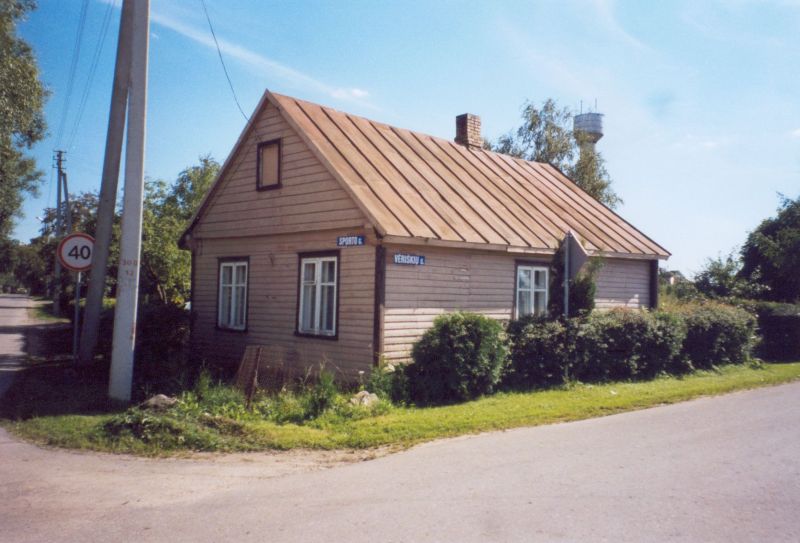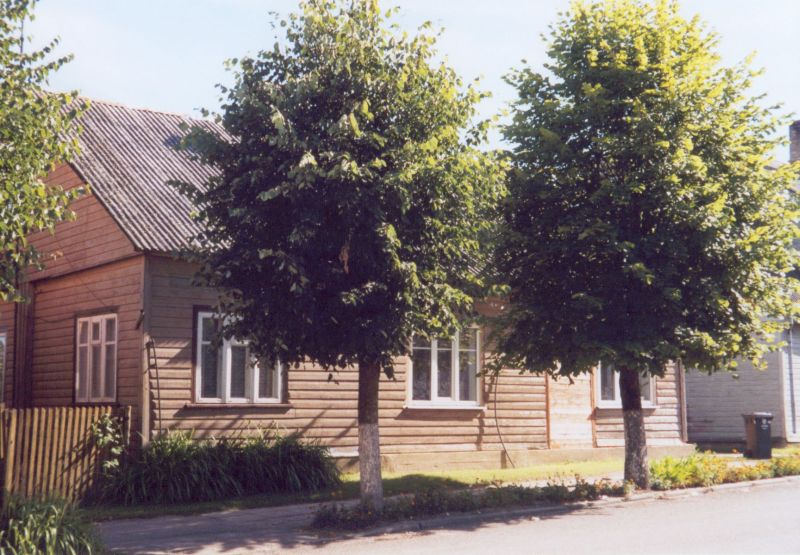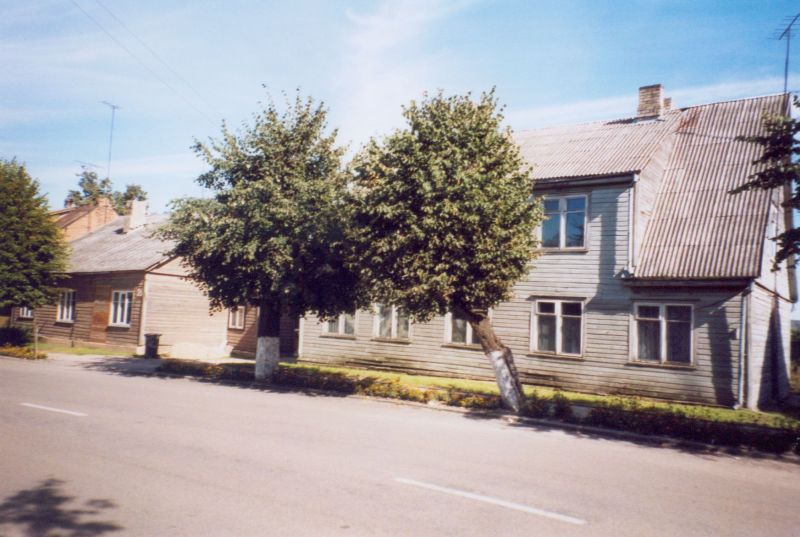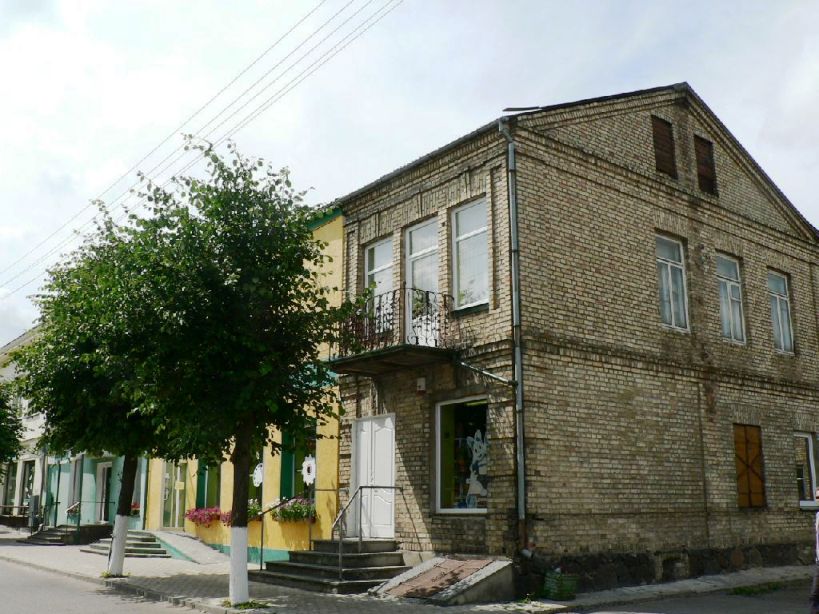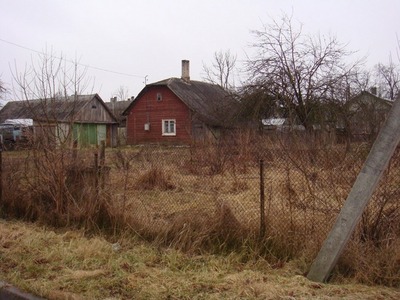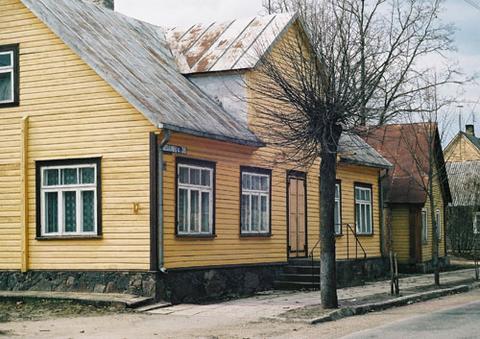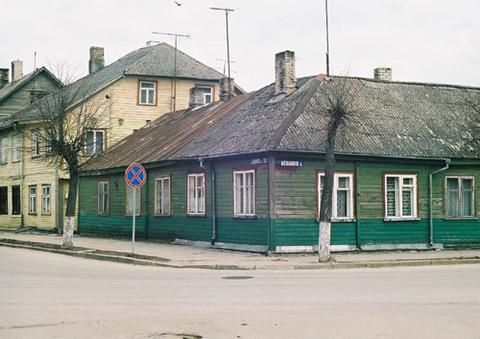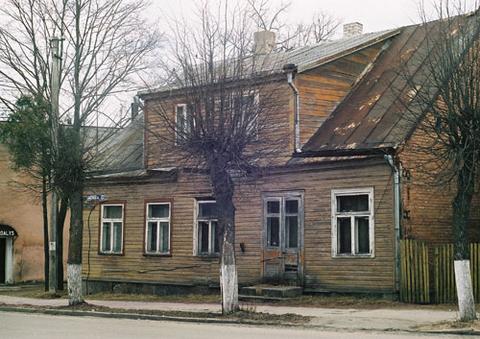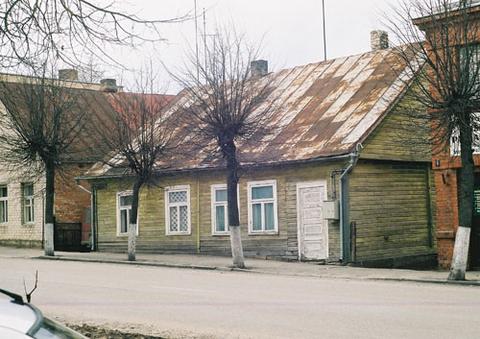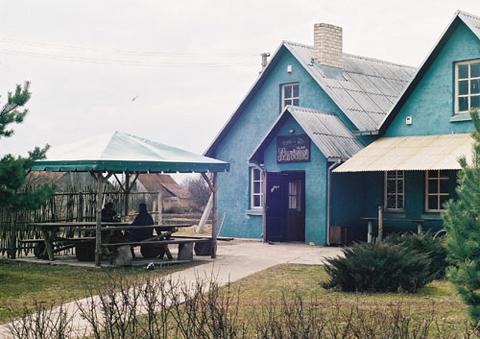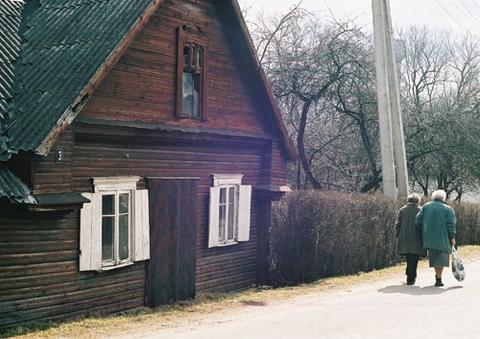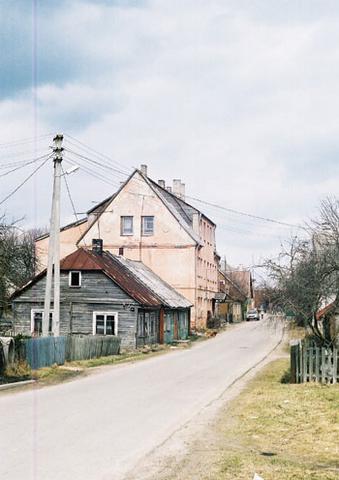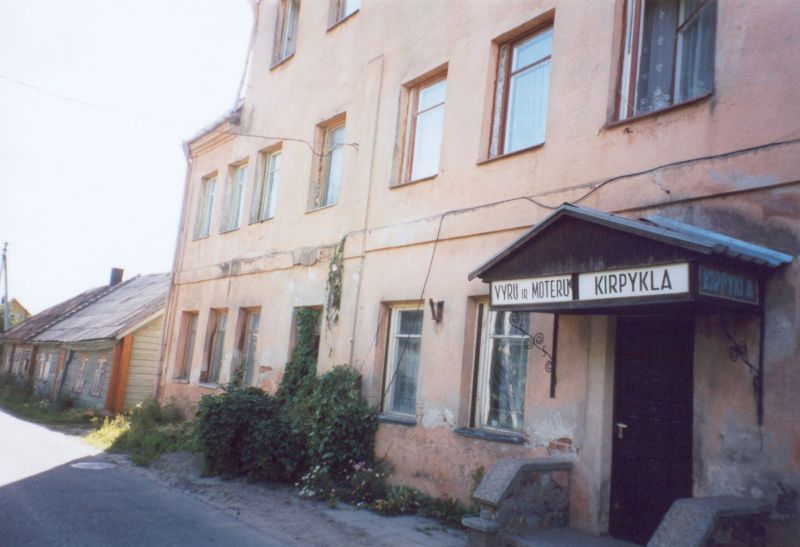Jewish Homes of Shadova - Šeduva

A Memory of the Shtetl
In 1990 three former natives of Shadova - Šeduva, Yehuda Grodnik, Baruch Gofer and Alter Kaplan, compiled a list of the names of the Jewish resdents of the town before the Shoah. To ease their memory they listed the names street-by-street and home by home. The result is a detailed memory of the life of the shtetl before its destruction. We learn of the layout of the town, the division between the Jewish and gentile residents, the professions and trades practiced and even get to hear about some of the more colourful members of the community.
Yehuda, Baruch and Alter note that at the centre of Shadova - Šeduva was the market square. Four roads branched out, Ponovezh Street to the north-east; Shavel Street to the north-west; Keidan Street to the south-east and Verishki Street to the south-west. The market square was surrounded by houses and shops that belonged to Jews, with the main Synagogue located at its centre. Jews also lived along all the four main streets, close to the market, while the Lithuanians lived in the houses further along the streets.
Yehuda, Baruch and Alter note that at the centre of Shadova - Šeduva was the market square. Four roads branched out, Ponovezh Street to the north-east; Shavel Street to the north-west; Keidan Street to the south-east and Verishki Street to the south-west. The market square was surrounded by houses and shops that belonged to Jews, with the main Synagogue located at its centre. Jews also lived along all the four main streets, close to the market, while the Lithuanians lived in the houses further along the streets.
Shadova - Šeduva
The Jewish Houses in the Market Square of Shadova - Šeduva and Surrounding Streets
The houses are noted by their street number, commencing with the hotel at the corner of the square with Verishki Street in a clockwise direction:
1 - At the marketplace corner with Verishki Street was a hotel. The widow Haya Cohen, her daughter and son in law Goldin, ran it. Their children were Ada and Meir. The hotel was known to be infested with ticks. Business was poor. Goldin burned it down and declared bankruptcy. In an attempt to get money he tied to jump from a moving train in the vain hope to collect damages from the government, who owned the train company, on the pretext that he had been pushed out. He then attempted to impress the family who was not impressed by his moneymaking ventures by threatening to drink poison. So much for Goldin.
2 - Moshe Itze (Itzhak) Brett was a well to do lumber merchant. His son Shlomo had three children. Moshe Itze Bret was the grandfather of former Knesset speaker Dov Shilansky. His eldest daughter (Dov’s mother) was the only girl in town who could play the piano.
The houses are noted by their street number, commencing with the hotel at the corner of the square with Verishki Street in a clockwise direction:
1 - At the marketplace corner with Verishki Street was a hotel. The widow Haya Cohen, her daughter and son in law Goldin, ran it. Their children were Ada and Meir. The hotel was known to be infested with ticks. Business was poor. Goldin burned it down and declared bankruptcy. In an attempt to get money he tied to jump from a moving train in the vain hope to collect damages from the government, who owned the train company, on the pretext that he had been pushed out. He then attempted to impress the family who was not impressed by his moneymaking ventures by threatening to drink poison. So much for Goldin.
2 - Moshe Itze (Itzhak) Brett was a well to do lumber merchant. His son Shlomo had three children. Moshe Itze Bret was the grandfather of former Knesset speaker Dov Shilansky. His eldest daughter (Dov’s mother) was the only girl in town who could play the piano.
3 - Krom, with his wife Vikhne and two children.
4 - A gentile lived here in a tall, two storey house.
5 - Shabtai Hack, the crippled butcher with his wife and four or five children.
6 - Sidrov, the owner of the electricity plant.
7 - At the corner of the Market Square with Shavel Street lived Velvel (Zeev) Peifert who ran construction supplies store there.
8, 9 - The horse harness workshop and house rented by a lithuanian named Biilutza.
10 - A tool shop owner who lived in the nearby town of Radviliskis and came to Shadova only on Thursday market day. .
11 - On the first floor was the Kamber leather shop with his apartment on the second storey. For some time a gentile lived there. 12 - Avraham Kaplan, owner of building supplies shop. His family residence was in same building.
13 - A fabric store. The name of the owner is unknown.
14 - Mirwis.
15 - The Kirpitznik shoe store and house.
16 - Berl (Dov?) Hirshel Payem, the only wheat merchant in Shadova - Šeduva and the region.
17 - Avraham Schuchman – bicycle repair.
18 - The fire station, run by a lithuanian.
19 - Moshe Yozint's grocery and home. Four or five children.
20 - Another grocery, the owner’s name was not remembered.
21 - Shmuel Margolis, a clerk and community activist.
22 - Avramowicz, the owner of a small store.
23 - Abba Meer, a grain and flax merchant. His son Zundel was employed in the business.
24 - The Sander construction materials shop.
25 - Hirshe, nicknamed Chipche, a diminutive grain merchant.
26 - Shmuel Noll, who had volunteered to the Lithuanian Army during the independence campaign after WWI, ran a fabric shop here.
27 - A Lithuanian barber, married to Menucha, the daughter of Raise the miller. Menucha concerted to Christianity.
28 - Mottel Girshowicz and his wife; Shalom and Nesia. A large retail and wholesale construction materials shop and sort of department store.
29 - The Bomke Meer fabric shop. The Freid family lived there, a teacher and his wife.
30 - Itche, the hat maker. Married with no children.
31 - Two story house where Ramnauskes, an anti-Semitic Lithuanian, lived. He had an iron shop. His son participated in the 'Aktzia' of the small ghetto of Kovno while he participated in the murder of the Jews of Shadova.
32 - Faivel Schuchman, fabric store.
33 - Faive Gidus the egg merchant. The couple had four children.
34 - Pinke Lerner, the crippled barber.
35 - Adjacent to the Gidus house lived Moshe Nissan Nisilewicz, a livestock and horse merchant and butchery.
36 - Moshe Swartz the barber. Lived with his mother, Sara, and Riva.
37 - Nussia and her two daughters. She lived off the support of relatives abroad. Moshe (?) married one of the daughters.
38 - Aharon Kushner, the egg merchant.
39 - A widow with two daughters. They had a quarrel with Nisilewicz over a pile of lumber on an empty lot next to them.
40 - The Hilimowicz family with four daughters and two sons. They lived on the second floor over their grocery. This was one of the few brick buildings in the town.
41 - Mottel the flour merchant. He also made confectionry. Taybe-Roche was in charge of sales.
42 - Israel Hyman Shnier. Another egg merchant.
43 - Fleisch the furrier with his wife and three sons.
44 - Bantze Bloch, the baker.
45 - Arke, the dumb tin worker.
46 - Shlomo Kuffer the butcher, Lea and six daughters. The house and shop were rented from Shneor Shaie. With them lived the midwife, Bobe Rochel.
47 - Guttman, lived off support from abroad.
48 - Faivke, married the daughter of Mira Schuchman. He had a clothes shop at the marketplace.
49 - Moshe Maisel the horse merchant. Before Passover he would bake matzoth.
50 - Judel Freidlander, the butcher. His family only had daughters.
51 - Zalman Davidowicz owned an unsuccessful shoe shop here. He received social help. Had a single son named Syomka.
52 - Noah Mirwis, in partnership with Kirpitznik the shoe merchant in the marketplace.
53 - Pinchas Rabinowicz, the Folksbank manager and grocery shop owner.
54 - Kalman Bruck, a son and a daughter. His business failed so he used their his daughter's dowry money.
55 - 'Fritz', a shoemaker in partnership with Chaiat. Three families lived in the same building. All had twin boys and were welfare cases. One of the boys studied at a Yeshiva and ate at other peoples homes as was customary.
56 - A long building housing two families.
57 - Pesia Gippel, a widow with two boys. Lived off support from abroad.
58 - Segal, a tailor with three sons.
59 - Rachmiel the wagon driver and son Velvke who used to sell trinkets.
60 - Hirsh Mendel Borochovitz. His son Berke emigrated to Brasil.
61 - Faivke Rotstein won a fortune of 10000 Lats from the state lottery.
62 - Itze Beer , son of Rachmiel, also a wagon driver with three sons.
63 - A lithuanian who repaired harmonicas.
64 - Moshe Zietzer with a crippled son.
65 - The lithuanian who managed thefire station.
66 - Lithuanians
67 - Lithuanians
68 - Avraham Kriger, a farm owner who worked in agriculture.
Next came an alley leading to the cemetery. There was the slaughter-house and the road to the railway station along which gentiles lived.
69 - Bartkinski. the flour miller.
4 - A gentile lived here in a tall, two storey house.
5 - Shabtai Hack, the crippled butcher with his wife and four or five children.
6 - Sidrov, the owner of the electricity plant.
7 - At the corner of the Market Square with Shavel Street lived Velvel (Zeev) Peifert who ran construction supplies store there.
8, 9 - The horse harness workshop and house rented by a lithuanian named Biilutza.
10 - A tool shop owner who lived in the nearby town of Radviliskis and came to Shadova only on Thursday market day. .
11 - On the first floor was the Kamber leather shop with his apartment on the second storey. For some time a gentile lived there. 12 - Avraham Kaplan, owner of building supplies shop. His family residence was in same building.
13 - A fabric store. The name of the owner is unknown.
14 - Mirwis.
15 - The Kirpitznik shoe store and house.
16 - Berl (Dov?) Hirshel Payem, the only wheat merchant in Shadova - Šeduva and the region.
17 - Avraham Schuchman – bicycle repair.
18 - The fire station, run by a lithuanian.
19 - Moshe Yozint's grocery and home. Four or five children.
20 - Another grocery, the owner’s name was not remembered.
21 - Shmuel Margolis, a clerk and community activist.
22 - Avramowicz, the owner of a small store.
23 - Abba Meer, a grain and flax merchant. His son Zundel was employed in the business.
24 - The Sander construction materials shop.
25 - Hirshe, nicknamed Chipche, a diminutive grain merchant.
26 - Shmuel Noll, who had volunteered to the Lithuanian Army during the independence campaign after WWI, ran a fabric shop here.
27 - A Lithuanian barber, married to Menucha, the daughter of Raise the miller. Menucha concerted to Christianity.
28 - Mottel Girshowicz and his wife; Shalom and Nesia. A large retail and wholesale construction materials shop and sort of department store.
29 - The Bomke Meer fabric shop. The Freid family lived there, a teacher and his wife.
30 - Itche, the hat maker. Married with no children.
31 - Two story house where Ramnauskes, an anti-Semitic Lithuanian, lived. He had an iron shop. His son participated in the 'Aktzia' of the small ghetto of Kovno while he participated in the murder of the Jews of Shadova.
32 - Faivel Schuchman, fabric store.
33 - Faive Gidus the egg merchant. The couple had four children.
34 - Pinke Lerner, the crippled barber.
35 - Adjacent to the Gidus house lived Moshe Nissan Nisilewicz, a livestock and horse merchant and butchery.
36 - Moshe Swartz the barber. Lived with his mother, Sara, and Riva.
37 - Nussia and her two daughters. She lived off the support of relatives abroad. Moshe (?) married one of the daughters.
38 - Aharon Kushner, the egg merchant.
39 - A widow with two daughters. They had a quarrel with Nisilewicz over a pile of lumber on an empty lot next to them.
40 - The Hilimowicz family with four daughters and two sons. They lived on the second floor over their grocery. This was one of the few brick buildings in the town.
41 - Mottel the flour merchant. He also made confectionry. Taybe-Roche was in charge of sales.
42 - Israel Hyman Shnier. Another egg merchant.
43 - Fleisch the furrier with his wife and three sons.
44 - Bantze Bloch, the baker.
45 - Arke, the dumb tin worker.
46 - Shlomo Kuffer the butcher, Lea and six daughters. The house and shop were rented from Shneor Shaie. With them lived the midwife, Bobe Rochel.
47 - Guttman, lived off support from abroad.
48 - Faivke, married the daughter of Mira Schuchman. He had a clothes shop at the marketplace.
49 - Moshe Maisel the horse merchant. Before Passover he would bake matzoth.
50 - Judel Freidlander, the butcher. His family only had daughters.
51 - Zalman Davidowicz owned an unsuccessful shoe shop here. He received social help. Had a single son named Syomka.
52 - Noah Mirwis, in partnership with Kirpitznik the shoe merchant in the marketplace.
53 - Pinchas Rabinowicz, the Folksbank manager and grocery shop owner.
54 - Kalman Bruck, a son and a daughter. His business failed so he used their his daughter's dowry money.
55 - 'Fritz', a shoemaker in partnership with Chaiat. Three families lived in the same building. All had twin boys and were welfare cases. One of the boys studied at a Yeshiva and ate at other peoples homes as was customary.
56 - A long building housing two families.
57 - Pesia Gippel, a widow with two boys. Lived off support from abroad.
58 - Segal, a tailor with three sons.
59 - Rachmiel the wagon driver and son Velvke who used to sell trinkets.
60 - Hirsh Mendel Borochovitz. His son Berke emigrated to Brasil.
61 - Faivke Rotstein won a fortune of 10000 Lats from the state lottery.
62 - Itze Beer , son of Rachmiel, also a wagon driver with three sons.
63 - A lithuanian who repaired harmonicas.
64 - Moshe Zietzer with a crippled son.
65 - The lithuanian who managed thefire station.
66 - Lithuanians
67 - Lithuanians
68 - Avraham Kriger, a farm owner who worked in agriculture.
Next came an alley leading to the cemetery. There was the slaughter-house and the road to the railway station along which gentiles lived.
69 - Bartkinski. the flour miller.
70 - Glike, the wife of Yoske Plott.
71 - Moshe Avraham, supported by Shmuel Beer. He was blind in one eye and had a walking stick he received from the Rabbi of Shavel. He married six times!
72 - The two single sisters of Avraham Kriger.
73 - The 'Melamed' (Cheder teacher) Hillel with his wife and retarded son.
74 - Yankel 'the Pachter' Levitt the rope and soft drinks manufacturer, with his three sons and three daughters. He was blind in one eye, had 3 sons and 3 daughters.
75 - Hishel Rozowsky. A family with many children.
76 - Blezis, the lithuanian schoolteacher who was involved in the killing of Shadova's Jews.
77 - Two women lived at that building.
78 - Abba Mer, who owned a warehouse for flax and seeds.
79 - Moshe Milchman.
80 - Gutke and Shalom Lazerov, and son and daughter.
81 - Zell, a new house. The wife used to tell beggers that the men are not at home.
82 - Unknown Jewish family.
83 - Shalom Girshowicz.
84 - Yankel Meltz.
85 - Avraham Shmuel the 'Melamed'. A widower who raised three daughters and two sons by himself. He was a fine teacher.
86 - Shulkin, his daughter Hana, mother Sara and grandmother Mera.
87 - Sara Beratchi and son.
88 - Faivel Stein , a wagon driver with his wife Libshe and four children.
89 - The shmates (rag) dealer. He kept a goat in his house.
90 - Itzik the hat maker and his wife Batia the seamstress.
91 - Kaile and son Berke Sadowicz who migrated to Israel.
92 - Avraham Itche Flitt the butcher.
93 - Bentche Bloch and sons Misha and Israel. They had a bakery and a construction material shop.
94 - Leibe Matis - flour and wheatgerm merchant.
95 - Mira Schuchman, fabric shop.
96 - Raise Meer, grocery.
97 - Yankel Druski, sons Shimke and Hirshke.
98 - The public house of Mottel and Dvorah Fleish.
99 - Mira Schuchman and her sister-in-law, Hana.
100 - Simche Hack.
101 - Menuche Hack and six sons.
102 - A tin worker with his wife Hana.
103 - Berel the Melamed (teacher), his wife Sara, and crippled daughter. They lived from support of Shmuel Ber.
104 - Arke Stein.
105 - Israel Kamenitz and his son Maisi who was the tin worker.
106 - Hirshe Druskin the butcher.
107 - Lebe Fuchs the Chazan.
108 - Leibke Peisa.
109 - Pinke
110 - Krenke
111 - Raise the flour miller and son Leibke who was retarded or mentally ill. The mill was next to the house
112 - The old slaughter house. The road from there lead to the wood where Jews where massacred.
113 - Yehiel Stein, his son in law Bentzel who carted the dead to the cemetery.
114 - Moshe Zelig the shamash, chazan and shochet. An exceptionally honest and fair person.
115 - Nachum Kaplan, Had a vegetable garden, sold seeds, Passover wine, owned a grocery. Had six children: Sara, Zelde, Mile, Nathan, Yankel and Shalom.
116 - Berel (Dov) Friedlander, wife Paya and girls Rinke and Fridke.
117 - Sara Riva.
118 - Iser the wagon driver and Velvake Flitt.
119 - Israel Hayman and Mashlen. The sold condoms and Red Cross lottery tickets. In the same house lived Rochel Taibe.
120 - 'Mazal u-Bracha' Hatzkel.
121 - Yossi 'Ba'al HaShever' Reuven.
122 - Teitelman, a synagogue Shamash.
123 - Haya Reize 'der Blinder' and her household.
124 - Yankel Levitt and three daughters and another family.
125 - Shmuel the water carrier. He was very poor. He read prayers for which he received a pair of boots in reward. Had a married daughter.
126 - Baruch Lemel and family, Moshe Eliyahu and Berta. There was an Inn at the house.
127 - Rabbi Mordechai Henkin. On the upper floor was the Jewish Folksbank.
128 - Braine Diamant. The grocery that she owned was sold to 'one armed' Leizer.
129 - Chaya Goldin.
130 - The Grodnik family. Hanoch, the father died in the small ghetto of Kovno. The son, Yosef Leib was a Rabbi at Telz and was murdered there with his wife Chasia, the daughter of Rabbi of Kelem.
Clearly there were many more Jewish homes in Shadova in the summer of 1941 before they were all emptied of their owners by the Nazis and their local colaborators. Still this list tells us much about the families, trades, wealth and poverty, religion, the odd crook, the healthy and the disabled. All the elements that make up human life.
71 - Moshe Avraham, supported by Shmuel Beer. He was blind in one eye and had a walking stick he received from the Rabbi of Shavel. He married six times!
72 - The two single sisters of Avraham Kriger.
73 - The 'Melamed' (Cheder teacher) Hillel with his wife and retarded son.
74 - Yankel 'the Pachter' Levitt the rope and soft drinks manufacturer, with his three sons and three daughters. He was blind in one eye, had 3 sons and 3 daughters.
75 - Hishel Rozowsky. A family with many children.
76 - Blezis, the lithuanian schoolteacher who was involved in the killing of Shadova's Jews.
77 - Two women lived at that building.
78 - Abba Mer, who owned a warehouse for flax and seeds.
79 - Moshe Milchman.
80 - Gutke and Shalom Lazerov, and son and daughter.
81 - Zell, a new house. The wife used to tell beggers that the men are not at home.
82 - Unknown Jewish family.
83 - Shalom Girshowicz.
84 - Yankel Meltz.
85 - Avraham Shmuel the 'Melamed'. A widower who raised three daughters and two sons by himself. He was a fine teacher.
86 - Shulkin, his daughter Hana, mother Sara and grandmother Mera.
87 - Sara Beratchi and son.
88 - Faivel Stein , a wagon driver with his wife Libshe and four children.
89 - The shmates (rag) dealer. He kept a goat in his house.
90 - Itzik the hat maker and his wife Batia the seamstress.
91 - Kaile and son Berke Sadowicz who migrated to Israel.
92 - Avraham Itche Flitt the butcher.
93 - Bentche Bloch and sons Misha and Israel. They had a bakery and a construction material shop.
94 - Leibe Matis - flour and wheatgerm merchant.
95 - Mira Schuchman, fabric shop.
96 - Raise Meer, grocery.
97 - Yankel Druski, sons Shimke and Hirshke.
98 - The public house of Mottel and Dvorah Fleish.
99 - Mira Schuchman and her sister-in-law, Hana.
100 - Simche Hack.
101 - Menuche Hack and six sons.
102 - A tin worker with his wife Hana.
103 - Berel the Melamed (teacher), his wife Sara, and crippled daughter. They lived from support of Shmuel Ber.
104 - Arke Stein.
105 - Israel Kamenitz and his son Maisi who was the tin worker.
106 - Hirshe Druskin the butcher.
107 - Lebe Fuchs the Chazan.
108 - Leibke Peisa.
109 - Pinke
110 - Krenke
111 - Raise the flour miller and son Leibke who was retarded or mentally ill. The mill was next to the house
112 - The old slaughter house. The road from there lead to the wood where Jews where massacred.
113 - Yehiel Stein, his son in law Bentzel who carted the dead to the cemetery.
114 - Moshe Zelig the shamash, chazan and shochet. An exceptionally honest and fair person.
115 - Nachum Kaplan, Had a vegetable garden, sold seeds, Passover wine, owned a grocery. Had six children: Sara, Zelde, Mile, Nathan, Yankel and Shalom.
116 - Berel (Dov) Friedlander, wife Paya and girls Rinke and Fridke.
117 - Sara Riva.
118 - Iser the wagon driver and Velvake Flitt.
119 - Israel Hayman and Mashlen. The sold condoms and Red Cross lottery tickets. In the same house lived Rochel Taibe.
120 - 'Mazal u-Bracha' Hatzkel.
121 - Yossi 'Ba'al HaShever' Reuven.
122 - Teitelman, a synagogue Shamash.
123 - Haya Reize 'der Blinder' and her household.
124 - Yankel Levitt and three daughters and another family.
125 - Shmuel the water carrier. He was very poor. He read prayers for which he received a pair of boots in reward. Had a married daughter.
126 - Baruch Lemel and family, Moshe Eliyahu and Berta. There was an Inn at the house.
127 - Rabbi Mordechai Henkin. On the upper floor was the Jewish Folksbank.
128 - Braine Diamant. The grocery that she owned was sold to 'one armed' Leizer.
129 - Chaya Goldin.
130 - The Grodnik family. Hanoch, the father died in the small ghetto of Kovno. The son, Yosef Leib was a Rabbi at Telz and was murdered there with his wife Chasia, the daughter of Rabbi of Kelem.
Clearly there were many more Jewish homes in Shadova in the summer of 1941 before they were all emptied of their owners by the Nazis and their local colaborators. Still this list tells us much about the families, trades, wealth and poverty, religion, the odd crook, the healthy and the disabled. All the elements that make up human life.
Sources
Shadova list made by Yehuda Grodnik, Baruch Gofer and Alter, presented first at Shtetlink site for Shadova - Šeduva by Nava Shulkin and Dora Bloom.
Please note that this article is not primary research and it may contain errors. Feel welcome to to suggest corrections.
Shadova list made by Yehuda Grodnik, Baruch Gofer and Alter, presented first at Shtetlink site for Shadova - Šeduva by Nava Shulkin and Dora Bloom.
Please note that this article is not primary research and it may contain errors. Feel welcome to to suggest corrections.
Copyright © 2009 Jon Seligman. All Rights Reserved.




